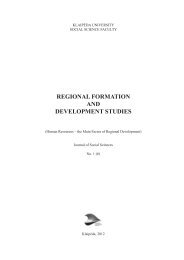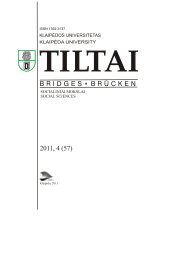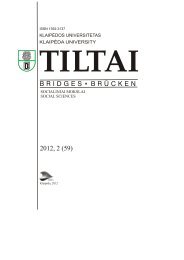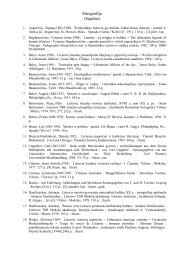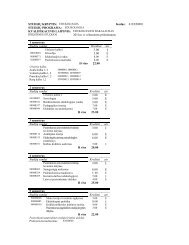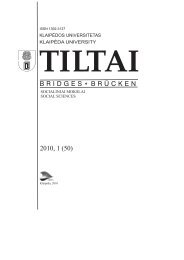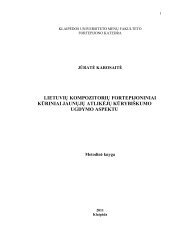2013,1 (62) - KlaipÄdos universitetas
2013,1 (62) - KlaipÄdos universitetas
2013,1 (62) - KlaipÄdos universitetas
You also want an ePaper? Increase the reach of your titles
YUMPU automatically turns print PDFs into web optimized ePapers that Google loves.
Trung Quang Dinh, Hilmar Þór Hilmarsson<br />
than one third of 154 survey takers said that they were avoiding overseas investments<br />
for fear of political violence. This report also stated that business leaders believe political<br />
violence risk is real and rising; and concerns about political violence are preventing<br />
companies from investing where they would like to invest (Lloyd’s, 2007).<br />
So what is political risk? There are many definitions of political risk. MIGA defines<br />
political risk as “the probability of disruption of the operations of MNEs by political<br />
forces or events, whether they occur in host countries, home country, or result<br />
from changes in the international environment. In host countries, political risk is largely<br />
determined by uncertainty over the actions of governments and political institutions,<br />
but also of minority groups, such as separatist movements. In home countries, political<br />
risk may stem from political actions directly aimed at investment destinations, such as<br />
sanctions, or from policies that restrict outward investment” (MIGA, 2009, p. 28).<br />
When discussing the reasons why a country needs to set up an ECA, Stephens 1 states<br />
that “political risks are those relating to the actions of governments in importing<br />
countries to prevent payment being made to the foreign exporter, for instance problems<br />
with transferring foreign currency. Default by government or public sector buyers<br />
or guarantors in another example, as is civil war” (Stephens, 1996).<br />
Beside political risk, commercial risk is also a concern of companies worldwide<br />
when they expand their business to emerging markets. The commercial risk is defined<br />
by the OECD (in the context of export credits) as “the risk of nonpayment by a nonsovereign<br />
or private sector buyer or borrower in his or her domestic currency arising<br />
from default, insolvency, and/or a failure to take up goods that have been shipped<br />
according to the supply contract” (OECD 2003). And Stephens has a quite similar<br />
definition on commercial risk “the principal commercial risks are insolvency of the<br />
buyer, default on payment by the buyer and repudiation of or refusal to accept the<br />
goods or services ordered” (Stephens, 1996). Commercial risk can be high in emerging<br />
markets where the financial system is still immature as compared to developed<br />
countries. The lack of financial information and the quality of information in these<br />
markets partly institutes the threats of commercial risk. Credit rating agencies and the<br />
exporters themselves cannot always assess credit worthiness comprehensively and<br />
sufficiently based on the limited financial information of their buyers.<br />
As Nerouppos et. al. emphasized in a study the lack of data in emerging markets<br />
can lead to tremendous difficulties for risk management. “Another problem, equally<br />
important from a risk management point of view, is that there is a startling scarcity of<br />
available data. Often, the institutional mechanisms that lead to the plethora of data in<br />
advanced markets do not exist (e.g. derivatives exchanges, secondary markets, and<br />
even regular auctions of a standard set of government bonds). Furthermore, those data<br />
that are available are contaminated for many reasons. Since many emerging markets<br />
have gone through some period of crisis, the history of local financial variables is of<br />
questionable value in calibrating mathematical models for assessing future risks. Any<br />
current price data that are available must be viewed in light of the volumes and<br />
1 Malcolm Stephens is Secretary-General of the International Union of Credit and Investment Insurers<br />
(Berne Union). He was formerly Chief Executive of the Export Credits Guarantee Department in the<br />
United Kingdom.<br />
14



